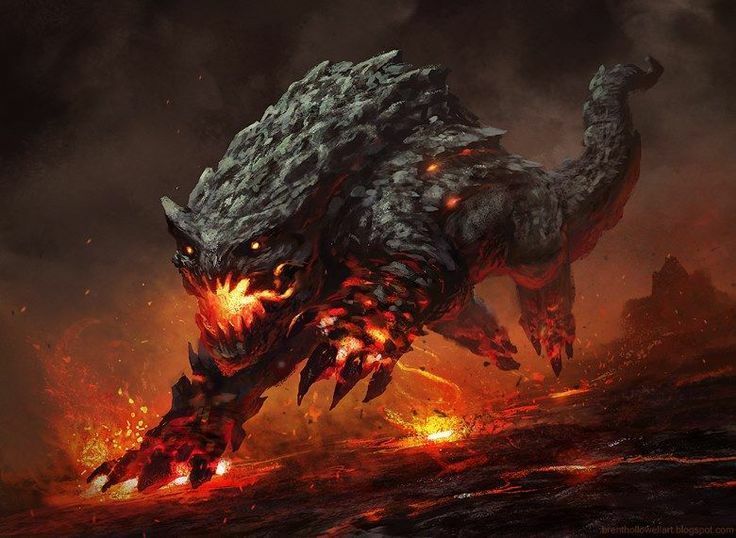Difference between revisions of "Fire Lizard"
Tao alexis (talk | contribs) |
Tao alexis (talk | contribs) |
||
| Line 1: | Line 1: | ||
{{Bestiarychart | {{Bestiarychart | ||
| name = Fire Lizard | | name = Fire Lizard | ||
| − | | species = [[Reptiles | + | | species = [[Amphibians & Reptiles|lizard]] |
| noapp = 1–4 | | noapp = 1–4 | ||
| behaviour = parasocial | | behaviour = parasocial | ||
Revision as of 22:12, 25 August 2020
| Species | lizard |
| No. Appearing | 1–4 |
| Behaviour | parasocial |
| Range | desert, subterranean |
| Size | 18 ft. long |
| Weight | 650 lbs. |
| Intelligence | 2 |
| Armour Class | 3 |
| Hit Dice | 10 |
| Action Points | 4 |
| Max. Stride | {{{stride}}} |
| THAC0 | 13 |
| Hp/Die | d10 |
| Attack Forms | claw/claw & bite |
| Damage | 1-8/1-8 & 2-16 |
| Special Attacks | breath weapon, immune to fire, jaws |
Fire lizards are ancestral forerunners of the dragon, though they haven't the lithe body shape nor maneuverability of the latter. Fire lizards are squat, brawny creatures with a field of bony scales over their backs and tails. They are slow moving and cannot run, being limited to a walking stride at best. They often rest for long periods; there is an even chance that when found, they will be sleeping.
Contrary to myth, fire lizards do not collect valuables, nor are they intelligent enough to be domesticated. When found below ground, it will usually be a lair affected by geothermal or nearby volcanic activity; outdoors, they prefer regions where such activity has created a hot, stifling desert, with pools of boiling mud, geysers and hot springs. They lay their eggs in warm mud pools, abandoning the eggs once they're laid.
With its other attacks, the fire lizard's breath weapon consists of a blast of flame 5 ft. wide and 15 ft. long (1 hex by 3 hexes). This causes 2-12 damage, half as much if a saving throw is made. Those who fail this save must also roll saving throw against magical fire for 3-12 outwardly carried items, determined randomly.
Additionally, these creatures have very powerful jaws. When a fire lizard rolls a natural 20, the damage done is triple, not double; each successive 20 then increases this multiplier by 1, so that a second 20 would mean quadruple damage and a third would be quintuple.
See Bestiary
